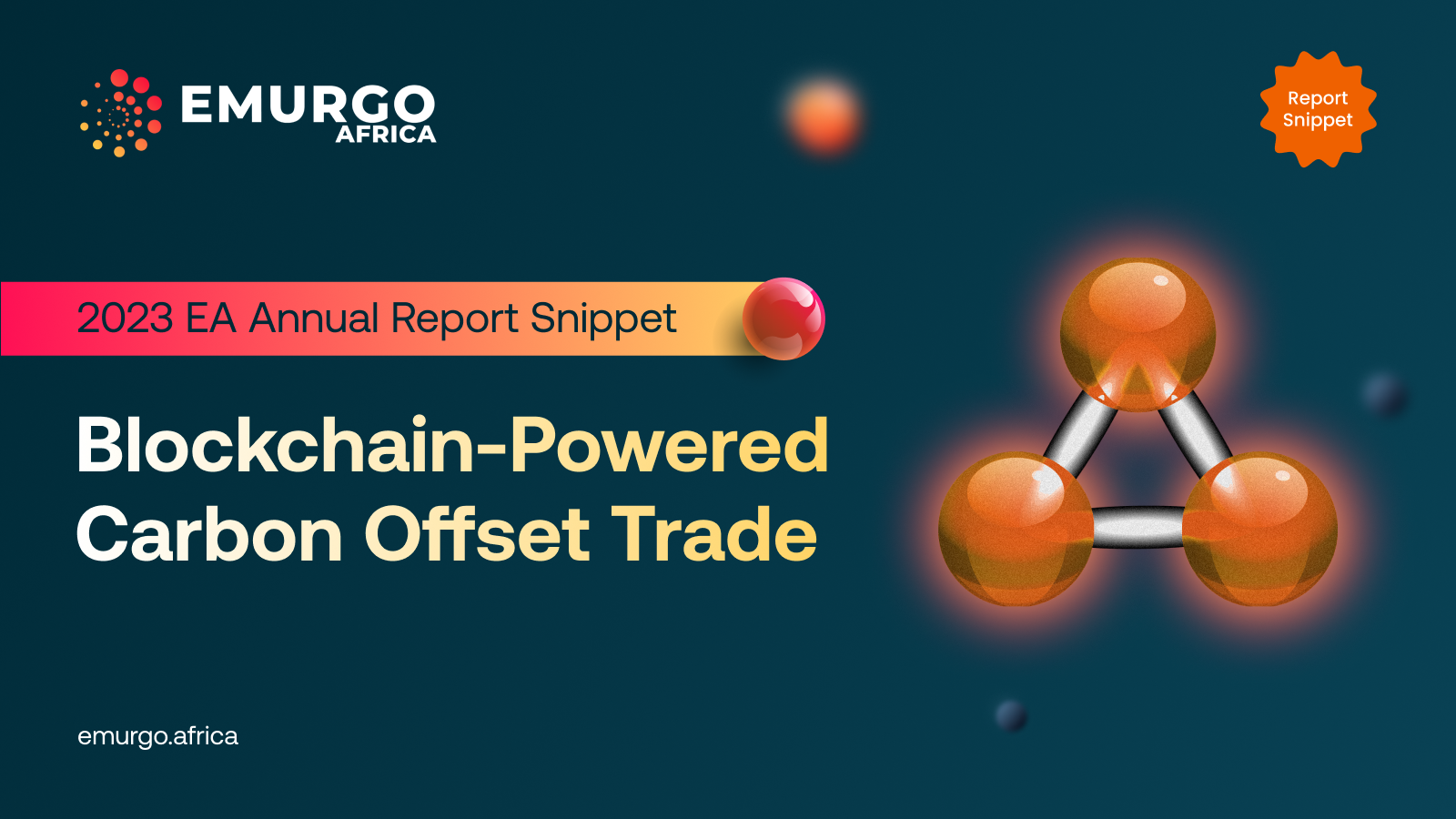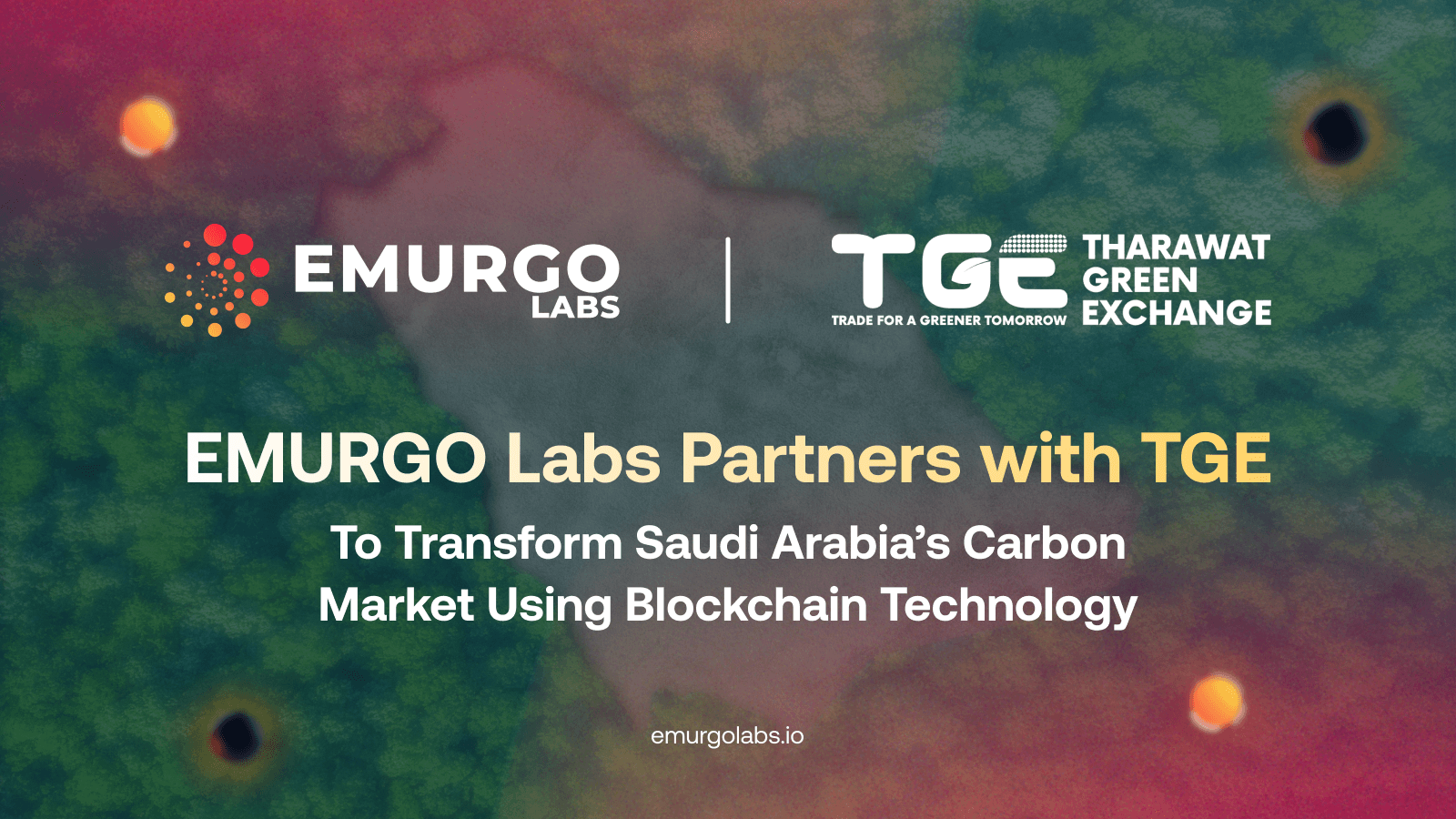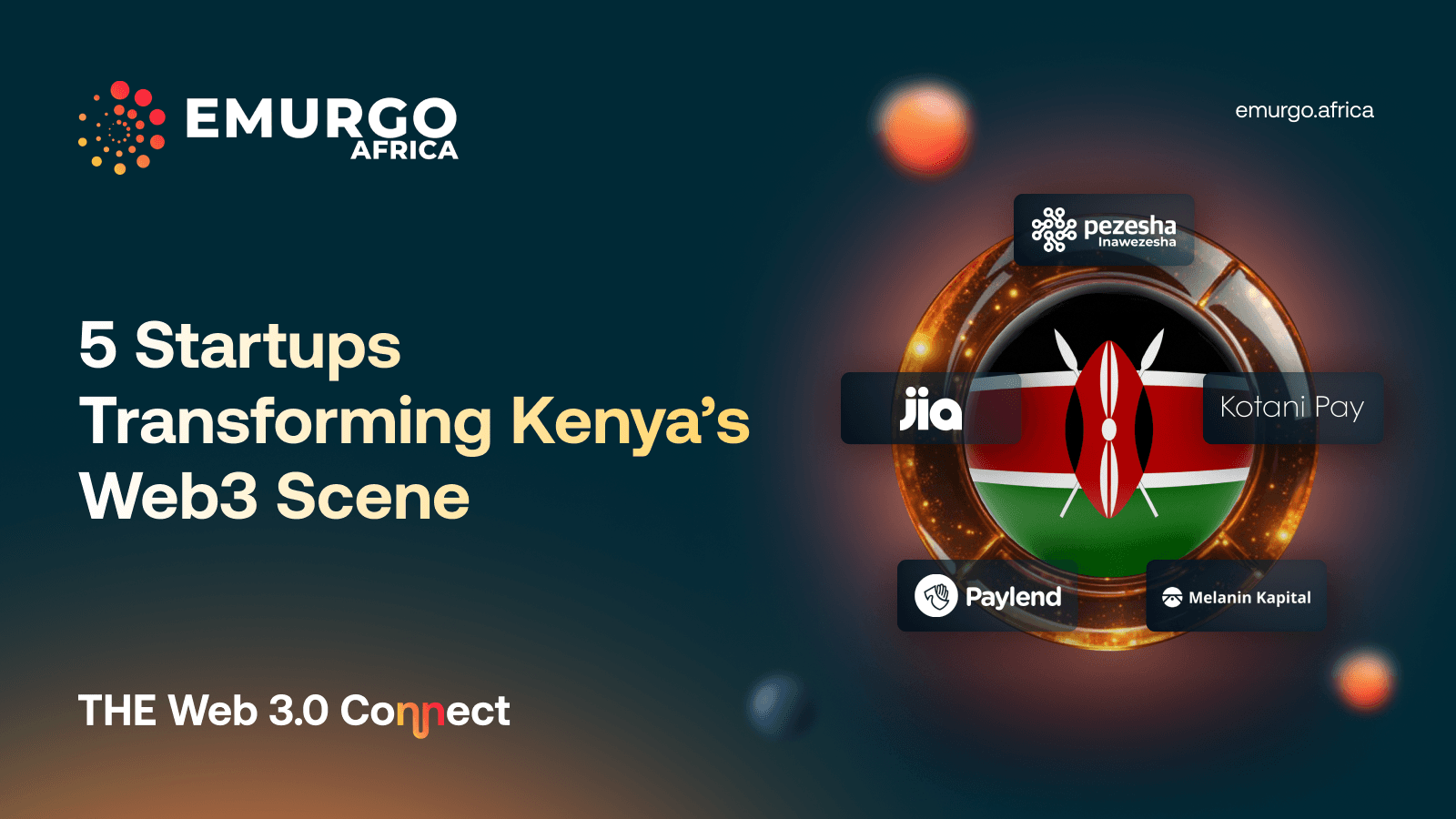Thank you for visiting our blog post 🦩🌟
In this post, we explore the critical challenges faced by the voluntary carbon market (VCM) in demonstrating and verifying the impact of carbon offsetting measures. Blockchain emerges as a solution to address credibility issues, fragmentation, and low liquidity in carbon markets. We introduce several existing blockchain-powered carbon trade platforms.
Table of Contents
- VCM’s credibility risk
- Blockchain brings credibility and opportunities
- Example of blockchain-powered carbon trade platform
VCM’s credibility risk is the most critical of its challenges
Because the voluntary carbon market (VCM) does not have an integrated and uniform marketplace and few companies participating in the marketplace have a government mandate to reduce their carbon footprint, the risk of fraud, manipulation, and misuse is extremely high in VCM1.
Indeed, in 2023, CEO of Verra, the world's leading carbon standard, stepped down2 after the Guardian reported serious allegations that more than 90% of the Verra’s certified rainforest offset credits, which are most widely used by companies, were not genuine carbon reductions3. Also, Corporate Accountability revealed that more than 90% of the carbon offsets Chevron, the US’s second-largest fossil fuel company, bought and counted towards its climate targets from VCM between 2020 and 2022 were too environmentally problematic to be classified as anything other than worthless or junk4.
In addition to the problem of exaggerated or false offsets being traded, there is also the risk of double counting, where the same carbon credits or offsets are sold and resold to multiple entities. VCM’s inability to credibly demonstrate and verify the impact of carbon offsetting measures is the most critical of its challenges and threat of its growth5.
Figure 3.5. Barriers to Ensuring Trusted and Efficient VCM
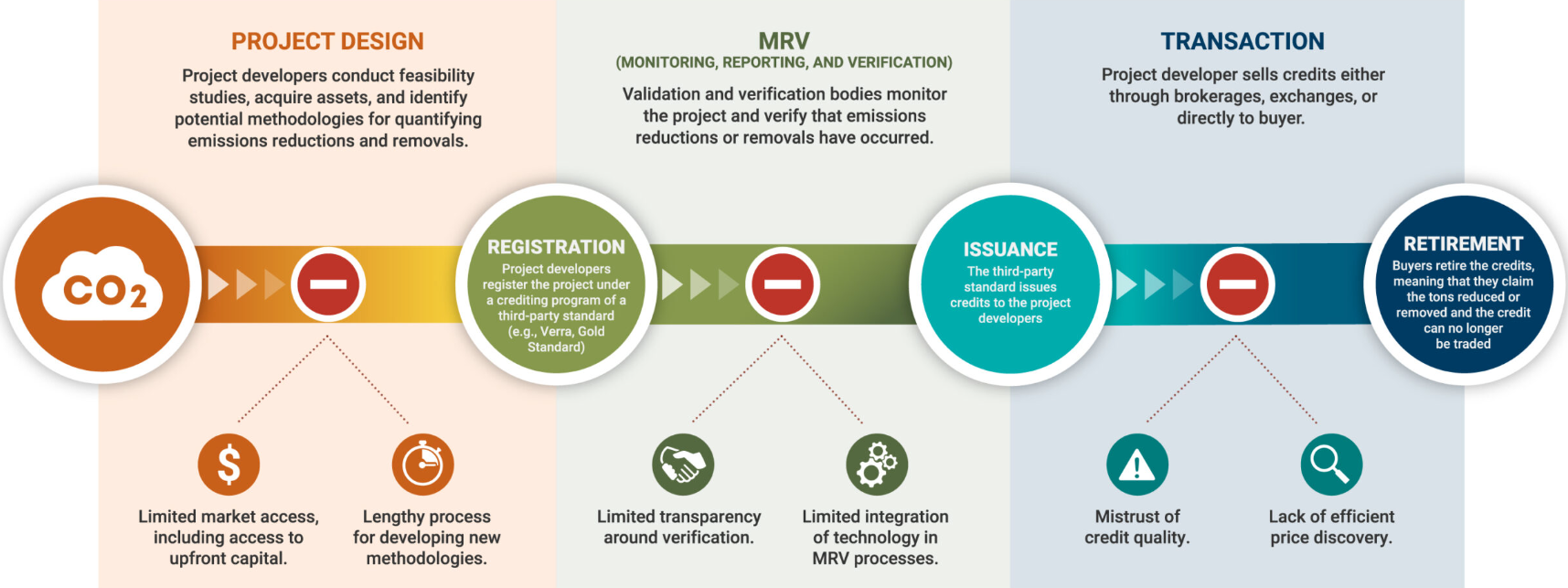
Source: Carbon Markets Initiative by RMI6
Blockchain brings credibility and opportunities to carbon markets
Blockchain is one of the technologies that is expected to address the credibility risk of the carbon markets. Due to their public, accessible and machine-readable format, blockchains provide the necessary foundation for a trustworthy and scalable VCM7.
Once the carbon registry is built on the blockchain, market participants can view a transparent digital record of every credit across geographies and standards, allowing global price and supply coordination7. Furthermore, combined with digital tools for measurement, reporting, and verification (MRV) such as remote sensors, drone imagery, and artificial intelligence, digital environmental assets and carbon accounting systems can provide real-time visibility into the effectiveness of emission reduction and absorption efforts7.
In addition to credibility enhancement, blockchain can also expand the potential of the carbon market by integrating it into the decentralized finance (DeFi) ecosystem. In the traditional carbon markets, credits are not interchangeable between projects: a unit of credit from a project that is considered more effective is valued higher than the other projects8. As a result, carbon markets are fragmented and have very low liquidity8.
Liquidity through DeFi's "Liquidity Pool" concept facilitates a more accessible and efficient carbon market. By introducing liquidity, users contribute project-specific credits (tokens) to the pool containing a mix of project-specific tokens representing similar projects8. In return, users receive a new token, which represents a whole pool rather than one specific offsetting project, allowing them to trade in highly liquid tokens instead of illiquid individual project-specific credits (tokens)8. This approach is more accessible, efficient, and cost-effective.
Figure 3.6. How Liquidity Pools Work in DeFi Ecosystem

Source: Figure cited from JamesBachini.com9; Note: In the figure above, liquidity pools used by popular automated market makers such as Uniswap and Sushiswap are explained. A pool contains a base asset such as ETH or USDT and a more volatile governance token such as UNI or SUSHI. Liquidity provider adds both assets to the pool, receiving LP (Liquidity Pool) tokens as a share of the pool. Traders use the pool to exchange assets. As assets ratio changes, assets prices are adjusted accordingly (the less, the higher price; the more, the lower price). For carbon credits, market makers can use the liquidity pool with project-specific tokens and tokens representing a whole pool to be traded with high liquidity.
In November 2023, Nasdaq launched new technology, which will utilize smart contracts, for secure digitization of carbon credit issuance, settlement, and custody10. Automation by smart contract is expected to enhance efficiency and transparency across trade processes, providing a comprehensive audit trail of credit ownership and retirement10. The service targets global market infrastructures and registry platforms, aiming to create a standardized, trusted ecosystem for attracting high-quality liquidity10.
Example of blockchain-powered carbon trade platform
Blockchain technology has the potential to bring credibility and greater market opportunities to the carbon market, and indeed, blockchain-based carbon offset trading platforms already exist.
Below is the list of blockchain-powered carbon trade platforms. Note that the companies listed below are selected by their presence in the digital carbon trade space based on our own research. Tech & Service information is gathered from their websites and docs available online. Fund information is from publicly available data including Crunchbase.
1. ClimateTrade (United States)
Offset Carbon Footprint - ClimateTrade™
Offset carbon footprint transparently and efficiently with our blockchain-based climate solutions. Verified carbon credits, iRECs, traceable impact.
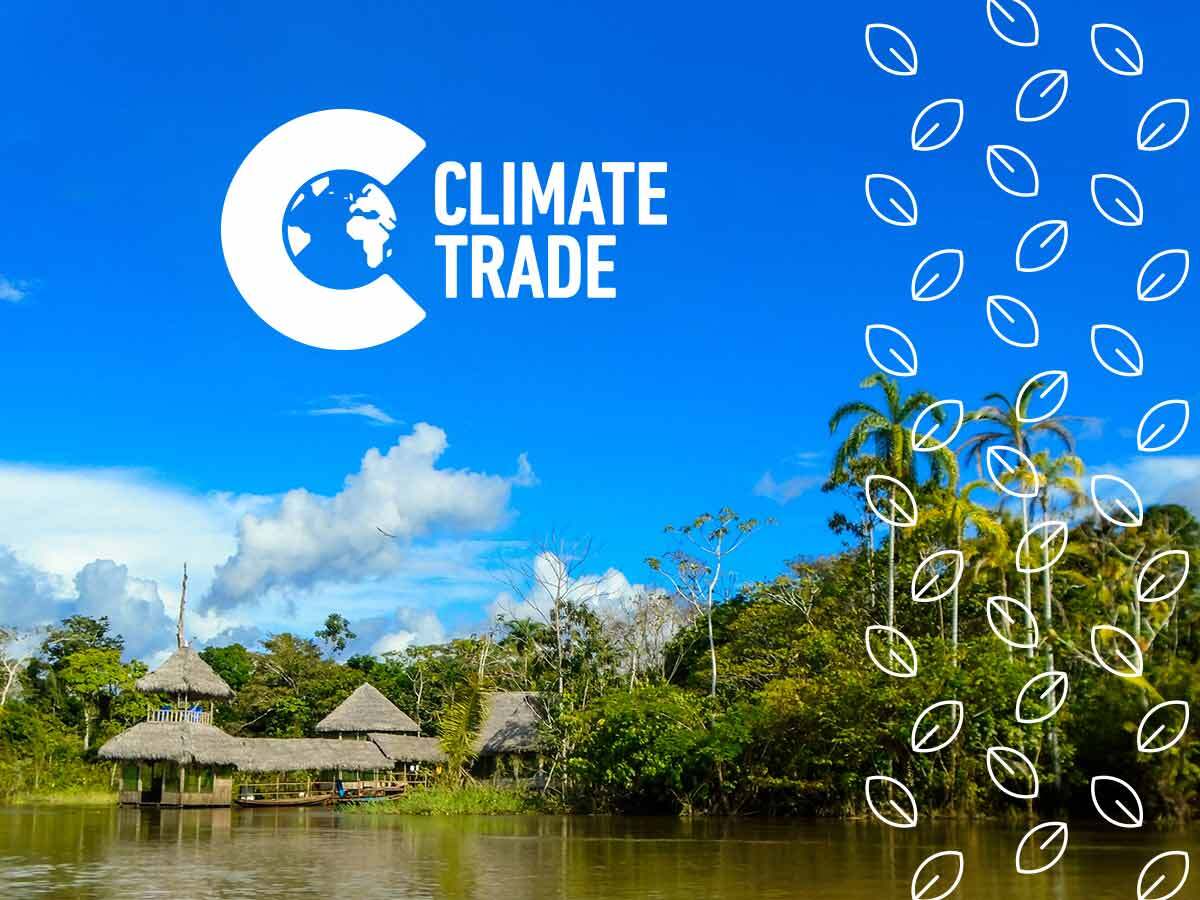
Year Founded: 2016
Tech & Service: The marketplace is built on Algorand blockchain11. It offers a broad range of verified carbon, plastic, and biodiversity credits. Other services include API, whitelabel carbon emission calculator, compliance assistance, carbon offset certificates, ESG reporting etc.
Fund: Raised €1M from Borderless Capital in their pre-seed round in 2019. Raised €1M from Algorand Europe Accelerator etc. in their seed round in 2020. Raised €7M from Borderless Capital, Algorand etc. in their pre-series A round in 2022.
2. GreenTrade (Germany)
GreenTrade Future Carbon Credits – GreenTrade is enabling to finance future nature and tech based carbon projects and help companies to meet their net-zero goals by providing tailored impact projects that fit their operations.

Year Founded: 2022
Tech & Service: The marketplace is built on Polygon Network12. It has functions including trading tokenized carbon credits, funding new projects through future tokens, retirement into GreenTrade vaults, offsetting dashboard and reporting API, tracking of project development, access & liquidity by fractionalizing assets.
Fund: Raised funding from Cerulean Ventures, Flori Ventures etc. in their pre-seed round in 2022.
3. KlimaDAO (United States)
KlimaDAO | Public good for our planet
KlimaDAO is addressing the coordination failure that has held back the global scale-up of climate finance.

Year Founded: 2021
Tech & Service: KlimaDAO is run on Polygon Network13. It leverages a stack of DeFi technologies. The infrastructure developed by their partners, Toucan Protocol and Moss.Earth, enables carbon credits that have been issued through robust processes developed by Carbon Standards to maintain their integrity on the blockchain. Once carbon credits have been transferred on-chain, they can begin to integrate with DeFi applications.
Fund: Raised $17M from PetRock Capital etc. in their seed round in 2021.
4. Nori (United States)
Carbon Removal Credits & Integrations for Climate Impact
Meet your business’ climate goals with verified carbon removals and integrations. Explore Nori’s marketplace for regenerative and permanent carbon removal solutions.

Year Founded: 2017
Tech & Service: The marketplace is built on both Polygon Network and Ethereum blockchain14. All their on-chain carbon removal credits issued to suppliers in the marketplace are represented by NFTs on-chain, which are traded and recorded in a publicly visible registry.
Fund: Raised $1.4M from Techstar etc. in their pre-seed round in 2019-2020. Raised $4M from Placeholder etc. in their seed round in 2020, followed by $7M series A round from M13 etc. in 2022. In 2023, Nori raised $6.3M from Cargill, M13, Placeholder, Toyota Ventures etc.
5. Regen Network (United States)
Regen Network / Invest in high-integrity carbon credits
Regen Network provides tools to create standards and market for sustainable companies to buy carbon credits and nature-based solutions to reduce carbon footprint

Year Founded: 2017
Tech & Service: The marketplace is built on Regen Ledger, a public proof of stake (POS) blockchain developed with Cosmos SDK15. Other services include verification of ecological credits including carbon and biodiversity for project developers and ecological accounting, claims, and credits development for stakeholders.
Fund: Raised $120k from Techstars in their pre-seed round in 2019. Raised funding by Initial Coin Offering (ICO) in 2021.
6. Senken (Germany)
Senken | Secure carbon credits to offset your company’s footprint
Secure and trusted carbon credit portfolios built for your industry. Offset CO2 footprint with our credits.
Year founded: 2022
Tech & Service: The marketplace provides easy and secure investment in individual carbon projects tokenized and brought onto the Celo blockchain by Flowcarbon16. It also offers carbon forwards, a new financial instrument, allowing pre-funding of climate projects that are still in development for a reduced price.
Fund: Raised funding in their seed round in 2022-2023, followed by $7.5M from Obvious Ventures, Kraken Ventures, Climate Capital etc. in 2023.
7. Thallo (United Kingdom)
Thallo | Tomorrow’s Carbon Market
Tomorrow’s Simple And Impactful Climate Action For Your Business And Your Clients Carbon Market Seamlessly integrate digital carbon credits into your operations, environmental impact and business
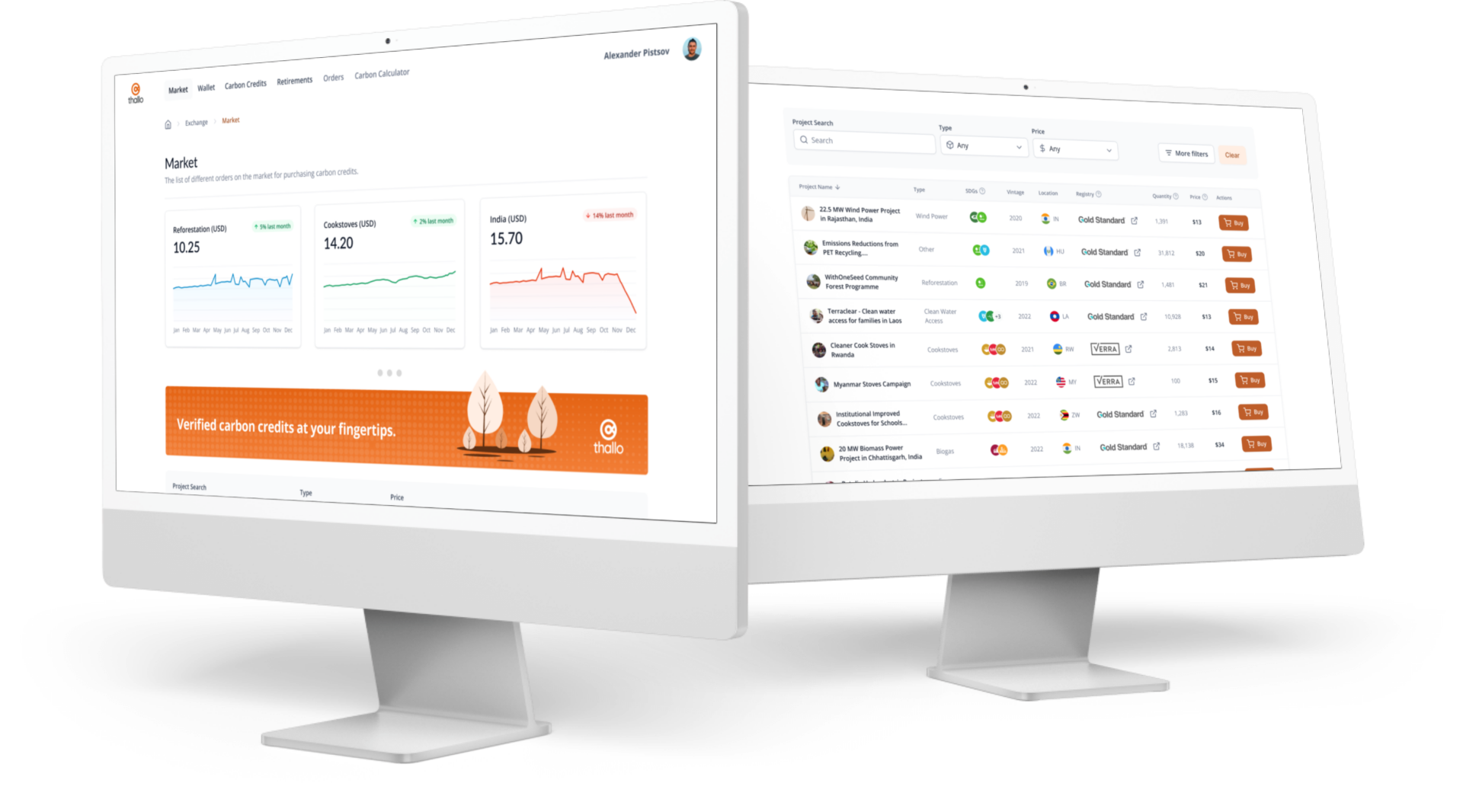
Year founded: 2021
Tech & Service: The marketplace is deployed on Polygon Network while Ripple and Celo are Thallo’s founding partners. Other services include carbon accounting consultancies and Carbon-as-a-Service (CAAS) API, allowing companies of all sizes to streamline their climate actions and offer carbon offsetting directly to their customers.
Fund: Raised $2.5M from Allegory Labs, Arcan Capital, Cerulean Ventures, Flori Ventures, Friendly Trading 2, Ripple in their seed round in 2022. In the same year, Thallo also received a grant from Climate Collective.
References
1. Carbon Credit Fraud — and How Blockchain Can Be Part of the Solution | Corporate Compliance Insights
2. CEO of biggest carbon credit certifier to resign after claims offsets worthless | The Guardian
3. Revealed: more than 90% of rainforest carbon offsets by biggest certifier are worthless, analysis shows | The Guardian
4. Destruction is at the heart of everything we do: Chevron’s junk climate action agenda and how it intensifies global harm | Corporate Accountability
5. Recommendation for the Digital Voluntary and Regulated Carbon Markets | World Economic Forum
6. Carbon Markets Initiative | RMI
7. Blockchain for Scaling Climate Action 2023 | World Economic Forum
8. Crypto Carbon: Can Blockchain Networks Fix Carbon Offsets? | Coindesk
9. Impermanent Loss Calculator | JamesBachini.com
10. Nasdaq Launches New Technology to Scale Global Carbon Markets | Nasdaq
11. ClimateTrade | Algorand Technologies
12. Technology | GreenTrade
13. A catalyst for innovation within the Voluntary Carbon Market | KlimaDAO
14. Nori Whitepaper | Nori
15. Invest in high-integrity carbon credits | Regen Network
16. Frequently Asked Questions | Flowcarbon
17. Three Questions to Choose the Right Blockchain for Your Purpose-Driven | Thallo
Thank you very much for reading this post 🦚✨
For downloading the full report, visit this page.
Follow EMURGO Africa for more information

EMURGO Africa invests and supports local Web3 projects in the region to adopt Cardano’s decentralized blockchain technology to build socially impactful solutions.
As a regional entity of EMURGO, the official commercial arm of Cardano, EMURGO Africa also runs a local Cardano accelerator in Africa, Adaverse, which accepts applications year-round.
For more up-to-date information on EMURGO Africa, follow the official channels listed below.
About EMURGO Africa
- Official Website: emurgo.africa
- X: @EmurgoAfrica
- Telegram: https://t.me/emurgoafrica

